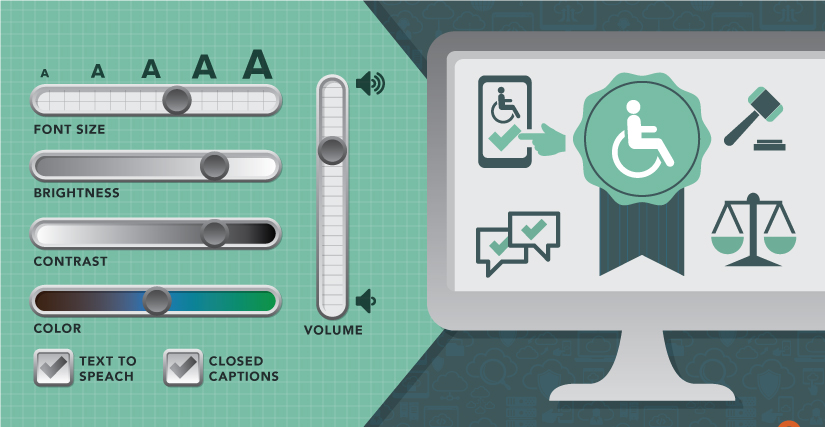Understanding website accessibility
The Americans with Disabilities Act (ADA) is one of America’s most comprehensive pieces of civil rights legislation. Established in 1990, the ADA lays out detailed standards for public accommodation for the disabled, among other things. As the digital world began to evolve, a new question began to arise: Does the ADA apply to websites, too? In this post, we explain where the website ADA compliance question lies today.
Background: A brief overview of the ADA
When the government created the ADA, only the very avant-garde used the Internet. Therefore, the question of whether or not the law applies to websites was unintentionally left open to interpretation.
In the mid-2000s, the DOJ hinted that the ADA may be applicable to websites. However, it did not issue any specific regulations. In 2008, the tech community, in an effort to protect itself from potential future litigation, created a set of guidelines known as the Web Content Accessibility Guidelines (WCAG), which designers and developers use in projects today. However, the DOJ has never officially adopted the guidelines, or issued any legislation pertaining to them.
ADA compliance for websites: An uncertain case
Many individual cases pertaining to this issue have moved through the US court system. However, there has yet to be an official consensus. So far, the courts have been nearly split. The 1st, 3rd, and 7th Circuits have ruled that the ADA does apply to websites; the 6th, 9th, and 11th circuits have ruled that it doesn’t. As of this writing, it is uncertain whether the DOJ will fully adopt the WCAG standards for all websites. (Currently, all government websites have adopted the standards.)
However, website ADA compliance is still a good idea.
So, you may ask, if the courts are divided and the DOJ does not currently have any set standards, why should you worry about website ADA compliance? The fact remains that even though no official regulations have been issued, the lack of consensus leaves businesses open to litigation. Organizations have been sued because their websites are inaccessible to disabled persons, and until there is an official consensus, you could be, too.
There are many other great reasons to make your website ADA compliant, including:
1. It’s good for business.
Pragmatically speaking, it simply makes good business sense for your website to be as accessible as possible for as many people as possible. If your website is illegible or unusable for certain people, you won’t be able to reach them, and you’ll miss out on valuable impressions, clicks, and sales.
2. Accommodation casts your brand in a positive light.
Accessibility communicates that your company cares about the disabled and does its best to serve all sorts of people. This is a powerful brand message that will elevate your company in the eyes of your clients, your peers, and your community.
3. Be good for goodness’ sake.
Of course, the most important reason to consider website ADA compliance is because it’s the right thing to do! It isn’t very difficult or expensive to ensure that your font size, site colors, and other factors are visible and legible to all, but it could make a world of difference for someone who needs to resolve a problem through your products and services. That’s why you started your company in the first place, isn’t it?
4. Get ahead of the game.
We don’t yet know when regulations will arrive, but in an increasingly socially-aware society, it is likely that they will. If you construct your website with ADA compliance in mind, it will already be up to standard when compliance regulations eventually arrive. Since re-building an entire website with disability accommodations can cost thousands or even tens of thousands, you’ll be saving yourself a significant amount of time, money, and worry.
“The internet has opened a world of information and opportunity to the blind and other people with disabilities that was previously closed, and making websites more accessible to them allows businesses to capitalize on that opportunity. In the long-run, making websites accessible is not only good for the reduction of legal risk, it is also smart business.” –Elizabeth Troutman, lawyer at Brooks Pierce
The bottom line: Yes, you should be concerned with ADA compliance.
As our lives become more and more internet-centered, individual users of all abilities will expect and demand that your site be clear, easy to use, and accessible to all. Building an ADA-compliant website is a win-win-win situation. It protects you against litigation; it brands your organization as inclusive; and it puts you ahead of competitors who may lag behind.






